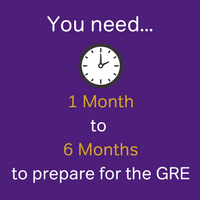
Here’s the answer to one of the most common GRE FAQ questions: You need at least 1 month and probably no more than 6 months to study for the GRE, depending on your situation. Factors that change how long you need to fully prepare for the GRE include the GRE test scores you need for your target grad schools, how long you’ve been out of school, how much you read, your language skills, your experience with standardized tests, and more. All of these factors will affect how hard the GRE is for you.
So what does this mean for you? Take Magoosh’s quiz to see our recommendations for how long you should study for the GRE, then come back to this post to find out everything you need to figure out when to start studying for GRE.
Set Your Test and Score Goals
You should carefully consider how long you should study for the GRE. Other students report needing one to six months to study, which is a pretty wide range. Ultimately, you need to figure out what works for you based on your unique situation.
First things first! To answer the question “How long should I study for the GRE?” you’ll need to know what your goals are. To do this, you’ll need to consider a few things:
Is English your first language?
Many GRE students don’t speak English as a first language. If you’re bilingual, this won’t be an issue. If you’re working on your language skills at the same time, we strongly recommend taking the TOEFL first if you can, but giving yourself an extended period of time to study even if you have to take the two tests the same week. Simply put, the GRE verbal is insanely difficult for non-native English speakers. If you fall into this camp, do not despair. You can still do well on the GRE verbal. But you may have to study for six months, or even longer (depending on your answers to the quiz questions).
How big a point increase do you want?
Of course, to know this, you’ll need to know what your current range is. The best (and only) way to get an accurate picture of this is to take a GRE practice test to identify your strengths and weaknesses. Then, with that range in mind, look at the programs you’re applying to and see how close you are to their students’ average scores.
How strong are your math skills?
Maybe you’re a quantum physicist. Or maybe you hear “pi” and think “apple.” If you work with math on a daily basis, you’re likely to need less preparation in that area, which may lower the amount of time you need to efficiently prep for the GRE. If you’re unsure about how strong your GRE math skills are, try a few GRE math practice questions out and see how you do! A GRE diagnostic can also help with this. (This is also a great way to see different math question types before test day.)
How competitive are the programs you’re applying to?
There is a big difference between a state college and a Harvard Ph.D. program. Most likely, your choices will fall somewhere in between. The more competitive the grad schools, the more you should prep. Also, note that some programs will only care about your score in one area, while some will care about your score in both. It’s usually pretty easy to tell which (physics programs tend to care far more about the quantitative section, while lit programs tend to be pretty focused on the GRE verbal section), but check with them just to be sure before devoting (or writing off) six months of GRE study that may not make a difference in your admissions chances.
Are you a reader?
If you have been reading diligently over the years, it is very likely that you’ve developed a strong sense of how vocabulary works in context. This will pay off big time and cut down on your need to study GRE vocabulary. And hence, you will not need as long to prepare for the GRE.
Do you like standardized tests?
I’ve tutored standardized tests for a while now. Some of my students seem to have a sense of how the tests are put together and how the answers are meant to trick you. Others are simply good at focusing for four hours at a time. None of this is a bad thing. If you are good at taking tests (scored well on your SATs, AP tests, etc. in high school), you should not have to study for more than four months.
Once you’ve thought honestly about all of those factors, you may not have an exact timeframe in mind for the GRE. However, you will have an answer to this question: how much do I need to prepare for the GRE? Your answer should be somewhere on the scale of “a little” to “a ton.” This translates to between 25 and 100+ hours of study. There are more ways, though, to narrow down that answer even more!
Decide How Many Hours per Week You Have Available to Study for the GRE
You’ve already seen that there are many factors that go into how long should you study for the GRE. Time to make that answer more concrete! Your personal schedule is going to affect how long it takes to prepare for GRE.
We’ve worked with a lot of students over the years, and we know that it’s very easy to fool ourselves when answering the question “How much time do I have to study for the GRE?” A lot of students answer the question “How much time do I wish I had to study for the GRE?” instead. To be honest with yourself, try this:
- Take a blank weekly planner page or a piece of paper you’ve divided into seven equal slots.
- Block out time for sleep (it’s important!)
- Block out all of the time you spend at work or school each day.
- Block out all the time you spend traveling to work or school.
- Look over your schedule for (or think back to) the past few weeks. How often have you seen friends, gone on dates, socialized? Put a block for that amount of time in your calendar, too.
- What family commitments do you have each week? Block out those (or an equivalent amount of time if they change).
- What other regular plans do you have? Even if it’s catching up on Netflix, if you’re going to do it, you should put it in. Block that time out, too.
The remaining amount of time on the calendar is how many hours you have to study for the GRE each week. You can be even more specific with this if you’re someone who loves following schedules and work out how many days to prepare for GRE you’ll spend…but it’s not necessary at this point.
Decide When You Want to Take the GRE
So when is test day? We’ve already said it:

But with that said, very few of us have the free time needed to take a test available each week. How long does the GRE take? Around 275 minutes maximum, which is a big chunk of your day! Plus, booking a spot early is important, since GRE test dates can fill up pretty early—particularly weekend dates.
Here’s what to keep in mind when you decide when you want to take the GRE:
- When are the deadlines to your programs? How early do they need your scores?
- How much preparation do you need for the GRE?
- How many hours a week do you have to prep for the GRE?
- Are there any weeks in which you cannot prep for the GRE? Going out of town, attending a conference, having a new baby…all of these things are super important, yet can hold up your study for anywhere from a few days to a few months.
After taking Magoosh’s GRE quiz and considering the above factors carefully, you know about how many hours of test prep you’ll need for your target score. You also know how many weeks you’ll have to do that prep. Divide the weeks by the hours, then look for a date in that range! As soon as you’re sure, book it in.
The other side of that question is when to start studying for GRE prep. The sooner, the better! (As long as you’re not too much more than six months away from your test date.) Even if you can only get in a few hours a week at the moment, sustained test prep over time really will make a difference.
Set up Your Timeline on a Calendar
Now that have a personalized answer to how long does it take to study for the GRE?, you can make specific study plans! With your timeframe in mind, check out Magoosh’s GRE study plans and guides for detailed, step-by-step study plans to get you the score you want on the GRE. We have everything from a one-week plan to a six-month plan; plans for those focused on verbal or math; plans for beginners and plans for advanced students. Trust us: there’s something for everyone!
To help you schedule, here are a few quick tips from me—including how to set up your practice to maximize your score as you figure out how to prepare for the GRE.
How can you start studying for the GRE today? Get those plans into your calendar (or at least, the dates on which you’ll follow them). Even more than that, Once you commit to studying on paper, it becomes much easier to fit into your life—and you become that much closer to the GRE score that you want!






Leave a Reply